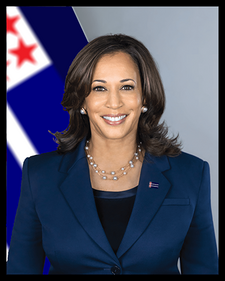President of Rizealand
| President of the Federation of Rizealand | |
|---|---|
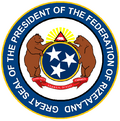 Presidential seal | |
 Presidential flag | |
| Executive branch of Rizealand Executive Staff of the President | |
| Style | Madam President (informal) The Honorable (formal) Her Excellency (diplomatic) |
| Status | Head of state, Head of government |
| Member of | Cabinet Homeland Security Council |
| Residence | Whitehall |
| Seat | Camden |
| Appointer | Direct election Two-round system |
| Term length | Five years, renewable once. |
| Constituting instrument | Articles of Federation |
| Formation | June 6, 1773 |
| First holder | James Camden |
| Salary | $719,000 rizals |
| Website | www.president.gov.rzl |
The President of the Federation of Rizealand (POTFOR) is the head of state and head of government of the Federation of Rizealand, making her the highest ranked executive officer and the the commander-in-chief of the Rizealand Armed Forces.
Although the president's power has grown over time as the Central Assembly was weakened through partisan division, some of the president's power was reduced by constitutional reforms passed in 1975. The presidency was created and vested with executive power by Article 4 of the Articles of Federation, which gives the president the responsibility to make sure all laws are faithfully executed, the power to sign legislation into law, and the duty to appoint executive officers, ambassadors, and judges. While this power used to be absolute, 1975 constitutional reforms allowed the president's appointment and removal powers to be restricted in certain situations and allowed the president's execution and enforcement responsibilities to be shared and exercised by other officials and agencies. The president also is in charge of foreign affairs, which includes appointing and receiving ambassadors, negotiating treaties, and commanding the Rizealand Armed Forces as commander-in-chief.
Originally, the president was indirectly elected by an electoral college for a five-year term, on the same ticket as the deputy president. Following the 1975 constitutional reforms, the president and deputy president are both elected directly by the national popular vote and limited to serving only two terms in office. There have been 33 presidents of Rizealand and the current president is Barbara Ward since she was first inaugurated on December 1, 2023, following the 2023 presidential election.
Legislative powers
Although the president is not vested with any legislative powers, the president has the ability to influence the passage and enactment of legislation nonetheless. Under Article 3 of the Articles of Federation, any bills passed by the Central Assembly must be signed by the president to take effect. If the president vetoes a bill, he must send a record of his objections to the house from which it originated and the Central Assembly can override a presidential veto with a three-fourths majority in both houses. If the president signs the bill or does nothing within ten business days of receiving it, it is enacted into law unless its constitutionally is challenged by the Attorney General.
In addition to vetoing or signing bills into law, the president has the constitutional responsibility to provide a "state of the federation" address to a joint session of the Central Assembly on a regular basis. Typically, the president gives this address to a joint session of the Central Assembly in the beginning of the year when the legislative session starts. These addresses offer the president an opportunity to outline his legislative proposals for the coming year and attempt to shape the direction of the Central Assembly. Informally, the president can also draft and suggest legislation for consideration by members of the Central Assembly.
Another legislative power of the president is the president's role in the administrative state. As head of the executive branch, the president has broad control over many executive agencies that issue their own regulations, guidance, and directives that compliment laws passed by the Central Assembly. However, this power is weaker today as many powerful and influential executive agencies are isolated from the president's control. These agencies either have officials appointed by the president but protected from any firing other than for-cause or do not have any officials appointed by the president, with appointing power going to others in the government.
Lastly, the president has the power to call the Central Assembly into session or adjourn them, if they are unable to do so themselves. However, this power has not been frequently exercised as the Central Assembly typically remains in session year-round.
Executive powers
Article 4 of the Articles of Federation explicitly vests executive power in the president who is tasked with ensuring all laws are faithfully executed. To assist the president in faithfully executing all laws, the Central Assembly has established numerous federal departments and agencies under the president's control. The heads of these agencies (most of whom are members of the Cabinet) and ambassadors are appointed by the president, with the advice and consent of the House of Representatives, and serve at his pleasure. Historically, the president's executive appointments had to be approved by a majority of the State Council. The 1975 constitutional reforms however tasked the House of Representatives with that responsibility instead. Although the president originally appointed all executive agency heads and could fire them at will, the 1975 constitutional reforms allowed for the Central Assembly to create executive/administrative agencies that could be led by agency heads 1) who were appointed by someone other than the president and 2) could be granted for-cause protections to prevent from arbitrary firing and provide some independence from the presidency. While some agencies have been created under this new design, many federal executive agencies are still run by agency heads appointed by the president and serving at his pleasure. Given the president's appointment and removal powers, he also has the ability to direct and lead executive agencies through executive directives and proclamations that are binding on executive agencies, except those considered independent of the president.
The president is tasked with receiving ambassadors, which has been interpreted to give him broad powers over foreign policy including the ability to grant recognition to a foreign government, appoint ambassadors and heads of diplomatic missions with the advice and consent of the State Council, and negotiate agreements on the behalf of Rizealand, subject to ratification by a three-fourths majority of the State Council. The president is also the commander-in-chief of the Rizealand Armed Forces. While the power to declare war is vested in the Central Assembly, the president is responsible for the direction and disposition of the military. The president also cannot deploy military force without an authorization for the use of military force from the Central Assembly, except in the case of an emergency, such as direct danger of invasion or attack. In addition to requiring the Central Assembly's approval to go to war or use military force, the president's war powers are also limited by the fact that the Central Assembly controls the military's budget.
The president also has the power to appoint all federal judges. Historically, the president nominated judges and they had to be confirmed by a majority of the State Council. After the 1975 constitutional reforms, the president no longer has the power to independently choose judges for appointment to the federal bench and must instead make his appointments from a list of candidates provided by a Federal Judicial Selection Committee. The president also has the power to grant pardons, reprieves, and commutations of sentences, although the 1975 constitutional reforms added the requirement that the president cannot issue a pardon for himself or any individual related by adoption, blood, or marriage. The president also has the advantage of executive privilege (which prevents him from having to disclose communications in the performance of official duties), national security privilege (blocks the disclosure of documents that could harm national security in court proceedings), and a form a immunity from civil and criminal actions during tenure as president. While one cannot pursue a criminal or civil action against the president during his tenure in office, statutes of limitations are considered tolled during the time he is in office and if the offenses are particularly egregious, the president could be removed from office by the Central Assembly.
Selection process
Eligibility
According to the Articles of Federation, to be eligible to serve as president of the Federation Rizealand, one must:
- Be a natural born citizen of Rizealand
- Be thirty five years of age, no later than on the day of inauguration as president
- Have resided in Rizealand five years prior to the day of inauguration as president
- Have not already served two terms as president
- Have not been permanently disqualified from public office by the Central Assembly following impeachment and removal from office
Campaigns and nominations
The presidential campaign begins usually in November to December of the year before the election year, when candidates usually announce their candidacy for the office of president and political parties will usually hold massive nominating conventions where they each will nominate a presidential candidate, usually by February. The conventions usually decide on the basis of straw polls and official surveys administered usually in early January or February to show preference among party members and the popular choice is usually honored but some conventions have made exceptions.
Upon selection of the nominees from each party, they will usually participate in campaign events which include televised and broadcasted debates, broadcasted nationally or locally and sponsored by independent organizations or news companies. They also participate in cross country tours, exhibitions, and will usually utilize armies of volunteers, literature, ads, and donations to get their messages across.
Election
Historically, the president was elected by an electoral college composed of electors representing each state on the basis of population and casting their vote in accordance with popular vote of that state. Of all the 1975 reforms, the elimination of the electoral college was the biggest. Since 1978, the president and deputy president are now directly elected directly by the national popular vote. In the presidential election, all citizens age 18 and older are eligible to participate and cast a ballot, including citizens living abroad and citizens living in territories. Because the winner is required to receive a majority (more than 50%) of the votes cast, there is always a possibility that the no candidate may receive the required majority and if that happens, a second run-off election is held with the top two highest vote getters (or more if multiple candidates are tied for first or second place). While this option has always existed, it has not yet happened as high thresholds for ballot access and the two-party domination by the NPC and TNC have prevented any success by third-party or independent candidates that would necessitate a run-off election.
While the laws governing elections are established in the Articles of Federation and laws passed by the Central Assembly, the independent Federation Election Commission is tasked with overseeing national elections. By law, the general election must take place on the first Sunday of the month of October. Because the president's term ends on the first day of December that same year, this gives a little less than two months to certify election results and hold a run-off election if necessary. In the event that the runoff election does not result in any candidate reaching the more than 50% threshold, the House of Representatives is authorized to pick the winner from the candidates in the run-off election. Disputes about election results are first resolved by the Federation Election Commission and are subject to judicial review.
Inauguration
Under the Articles of Federation, the five-year term for the president and deputy president begins at noon on December 1, known as Inauguration Day. Before assuming office, the president is required to give the following oath:
I, (Name of President) do solemnly swear to uphold and execute the high Office of President of the Federation of Rizealand to the best of my abilities and that I will, to the best of my ability, protect, defend, and uphold the Articles of Federation and the laws and bylaws of this Federation.
Incumbency
Term limits
Historically, there was no limit to the number of terms a president could serve. While most presidents throughout Rizealand's history have stuck to two terms in office, three presidents were elected to three terms: Shane MacNally from 1823 to 1838, Jamie Wright from 1863 to 1874, and Zachary Fagan from 1918 to 1932. Under the 1975 reforms, presidents were limited to only two terms in office, regardless of whether those terms are consecutive or not. Because the language of the Articles of Federation simply refer to terms in office, legal scholars believe that a deputy president who becomes president in the middle of another president's term can only run for office one additional time.
Vacancies and succession
According to the Articles of Federation, upon the president's death, resignation, or removal from office, the deputy president becomes president. Four deputy presidents have become president after the president's death in office: Jean-Pierre Gilson in 1843, Arthur Graham in 1874, George Beaumont in 1915, and Mason Cole in 1932. In 1966, Deputy President Chuck Beeman became president after President Nathan Chambers became the first president to be impeached and removed from office by the Central Assembly. If the office of deputy president is also vacant, the second person in the line of succession is the Speaker of the House of Representatives. Although the speaker has never needed to become president, the fact that a vacant speakership can be filled by the House of Representatives means the House of Representatives is the one who ultimately gets to pick the president if the presidency and deputy presidency are both vacant. The Articles of Federation also allow for the Central Assembly to designate, by statute, a list of successors who can become acting president if the speakership is vacant. However, those successors would only be president until the House of Representatives elects its speaker. Currently, the presidential list of succession includes members of the cabinet and the chief executives of the various states in Rizealand.
Removal
The President can be removed from office through one of three ways. First, under the Articles of Federation, the Central Assembly may impeach and remove from office any high federal official, including the president, for "despicable acts, crimes, or irreproachable violations of the public trust." The House of Representatives has the sole responsibility of impeachment. Typically, the House's committees will draft articles of impeachment and then those articles must be adopted by a majority of the House's membership. Once the House of Representatives has impeached the president, the responsibility of determining removal falls upon the State Council. While the House of Representatives is the only legislative body than can draft articles of impeachment, the 1975 constitutional amendments also allow the public to request impeachment via petition. With 10% of the signatures from the voters in the last presidential election in all 8 states, members may present a petition to the State Council requesting they remove the president from office, while detailing the impeachable offenses or charges. Upon receiving an impeachment petition from the voters or articles of impeachment from the house, the State Council must conduct a trial of the president and can remove him from office if 3/4 of the membership agrees. By a simple majority upon removing the president, the State Council may also bar the president from holding any future public office. Throughout history, the House of Representatives only impeached two presidents. In 1966, the House impeached President Nathan Chambers for corruption, illegal activities, and abuse of power. And in 1991, the House impeached President Sean McNulty for engaging in illegal activity to cover up an extramarital affair while president. Of the two times a president has been impeached however, the State Council only voted to remove Nathan Chambers from office.
The second method of removal was created by the 1975 civil rights amendments to the Articles of Federation and allows the president to be removed from office via recall. A recall election may be instituted one of two ways. First, voters may trigger a recall election by drafting a list of reasons for the recall (similar to articles of impeachment) and receiving enough signatures from registered voters to equal 20% of the voters in the last presidential election from each state. Second, the Central Assembly may institute a recall election by either a joint resolution of both houses (only requires a simple majority in each house) or an individual resolution from the House or State Council (which would require a 3/4 majority). In a recall election, all voters are presented with the charges against the president and the president's written rebuttal when the vote. When voters cast the ballots, they are first asked whether to removal the president from office and then they are asked if the president should be barred from holding office for life. A recall vote is successful only if 2/3 of the votes cast are for removal. Unlike some other forms of recall, voters do not get to select a replacement and once the recall results of certified, the president must immediately resign his office and the vacant presidency is filled by the next official in the line of succession. While multiple attempts to recall the president have been attempted since 1975, no effort has ever been successful as campaigns have struggled to reach the minimum signature threshold of 20% in each state.
The third and last method for removal allows the president to be removed from office by his own cabinet. If a simple majority of the president's cabinet votes to remove the president on account of physical or mental inability, the president is temporarily relieved of duty when the cabinet's signed order is provided to the Speaker of the House and the Deputy President (or leader of the State Council of the deputy presidency is vacant). The president may contest the cabinet's determination and if the president and cabinet are in disagreement on his mental or physical fitness, the State Council must determine if the president has mental or physical fitness. If 3/4 of the State Council do not find the president lacking or if the State Council cannot agree and delays a determination, the president resumes his position.
Privileges and compensation
The president's annual salary is set at $719,000 rizals, along with a $90,000 rizals expense account, a $180,000 rizals travel account, and a $34,000 rizals entertainment account. While the president's salary is set by the Central Assembly in the national budget, the Articles of Federation prohibit the president's salary from being increased or decreased during his term in office. After leaving office, the president is guaranteed an annual pension of $359,000 rizals.
The Whitehall Presidential Mansion serves as the official residence of the president in Camden. However, the president also has working offices in the Central Executive Complex and access to a country residence in San Andreas called Camp Big Sur. For ground travel, the president is chauffeured around in an armored limousine called Motor One. For air travel, the president is either flown around in a customized private executive jet called Air One or a fleet of helicopters called Chopper One. The president also has access to a large customized luxury yacht named that serves as a diplomatic vessel for certain receptions as well as another private retreat for the president.
For protection, the president is protected both by uniformed military personnel from the Republican Guard and civilian executive protection agents of the Federal Police.
List of presidents
| No. | Presidency | Portrait | President | Party | Election | Deputy President |
|---|---|---|---|---|---|---|
| 1 | December 1, 1773 - December 1, 1783 |

|
James Camden | Independent | 1773 1778 |
Eli Murray |
| 2 | December 1, 1783 - December 1, 1788 |
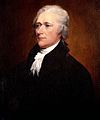
|
Eli Murray | Federalist | 1783 | Ethan Hudson |
| 3 | December 1, 1788 - December 1, 1798 |

|
Thomas Rogers | Confederate | 1788 1793 |
Benjamin Raferty |
| 4 | December 1, 1798 - December 1, 1808 |

|
Benjamin Raferty | Confederate | 1798 1803 |
George Gallagher |
| 5 | December 1, 1808 - December 1, 1818 |
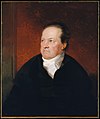
|
George Gallagher | Confederate | 1808 1813 |
Charles Kavanaugh (1808-1813) Jacob Cox (1813-1818) |
| 6 | December 1, 1818 - December 1, 1823 |

|
Percy Murray | National Republican | 1818 | Reuben MacRory |
| 7 | December 1, 1823 - December 1, 1838 |

|
Shane MacNally | Democrat | 1823 1828 1833 |
Jonathan Ellis (1823-1828) Benjamin Harrison (1828-1838) |
| 8 | December 1, 1838 - December 1, 1843 |

|
Benjamin Harrison | Democrat | 1838 | Scott Austin |
| 9 | December 1, 1843 - December 25, 1843 |
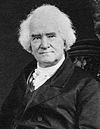
|
Frederick Doyle | National Republican | 1843 | Jean-Pierre Gilson |
| 10 | December 25, 1843 - December 1, 1848 |

|
Jean-Pierre Gilson | National Republican | N/A | Vacant |
| 11 | December 1, 1848 - December 1, 1858 |
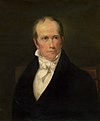
|
Billy Robertson | Democrat | 1848 1853 |
Franklin Lewis |
| 12 | December 1, 1858 - December 1, 1863 |
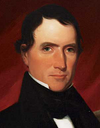
|
Franklin Lewis | Democrat | 1858 | Charles Blaine |
| 13 | December 1, 1863 - April 1, 1874 |

|
Jamie Wright | National Republican | 1863 1868 1873 |
Alexis Blanchet (1863-1870) Arthur Graham (1873-1874) |
| 14 | April 1, 1874 - December 1, 1878 |

|
Arthur Graham | National Republican | N/A | Vacant |
| 15 | December 1, 1878 - December 1, 1888 |

|
Hugo O'Neilan | National Republican | 1878 1883 |
Jayden Powell |
| 16 | December 1, 1888 - December 1, 1903 |
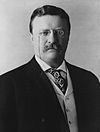
|
Chris Sharp | National Republican | 1888 1893 1898 |
Bobby Haverford (1888-1893) Oliver Adams (1893-1898) Josh Warwick (1898-1903) |
| 17 | December 1, 1903 - December 1, 1908 |

|
Josh Warwick | National Republican | 1903 | Gabriel Burton |
| 18 | December 1, 1908 - August 17, 1915 |

|
Gabriel Burton | National Republican | 1908 1913 |
George Beaumont |
| 19 | August 17, 1915 - December 1, 1918 |
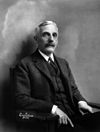
|
George Beaumont | National Republican | N/A | Vacant |
| 20 | December 1, 1918 - February 5, 1932 |

|
Zachary Fagan | Democrat | 1918 1923 1928 |
Mason Cole |
| 21 | February 5, 1932 - December 1, 1938 |
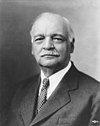
|
Mason Cole | Democrat | 1933 | Maddie Fagan (1933-1938) |
| 22 | December 1, 1938 - December 1, 1948 |
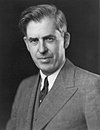
|
Tyler Sharp | Democrat | 1938 1943 |
Ricardo Mendez |
| 23 | December 1, 1948 - December 1, 1958 |
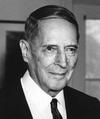
|
Douglas Sutton | National Republican | 1948 1953 |
Nathan Chambers |
| 24 | December 1, 1958 - May 18, 1966 |

|
Nathan Chambers | National Republican | 1958 1963 |
Will Bader (1958-1962) Charles Beeman (1963-1966) |
| 25 | May 18, 1966 - December 1, 1968 |

|
Charles Beeman | National Republican | N/A | Vacant |
| 26 | December 1, 1968 - December 1, 1978 |

|
Jack Holland | NPC-Democrat | 1968 1973 |
Harry Wallace |
| 27 | December 1, 1978 - December 1, 1983 |

|
Floyd Russell | NPC-Democrat | 1978 | Bradley Greendale |
| 28 | December 1, 1983 - December 1, 1993 |

|
Sean McNulty | National Republican | 1983 1988 |
Nathan Barrett |
| 29 | December 1, 1993 - December 1, 2003 |

|
Matthew Duncan | NPC-Democrat | 1993 1998 |
Peter Bowman (1993-1997) Harvey Grayson (1998-2003) |
| 30 | December 1, 2003 - December 1, 2008 |

|
Remy Chapelle | NPC-Green | 2003 | Abel Ochoa |
| 31 | December 1, 2008 - December 1, 2018 |

|
Dominique Horiatio | NPC-New Democrat | 2008 2013 |
Stephen Crew |
| 32 | December 1, 2018 - December 1, 2023 |

|
Cal Aderhall | TNC-Conservative Reform | 2018 | Neil Harper |
| 33 | December 1, 2023 - present |
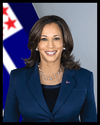
|
Barbara Ward | NPC-New Democrat | 2023 | Oscar Willis |
